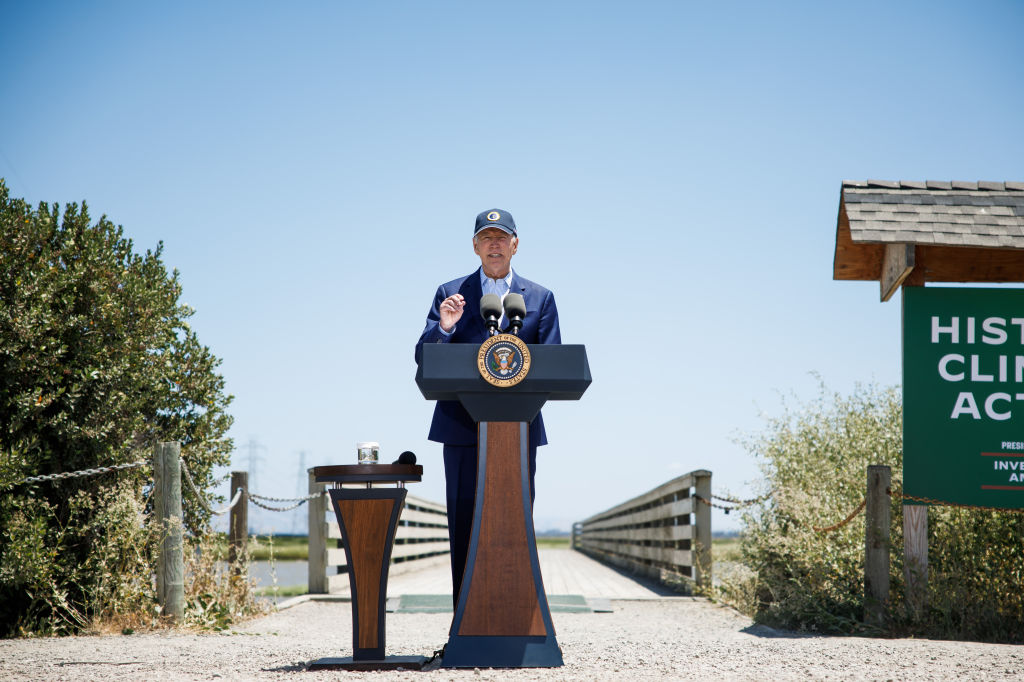
The Biden Administration is on tour this week, fanning out across the country to show how money from his landmark spending bills is driving investments in communities across the country.
On the surface, the tour has very little to do with climate. Indeed, the word “climate” is mentioned only once in the lengthy White House announcement. And yet climate change is everywhere. Vice President Kamala Harris is highlighting communities hard hit by environmental justice challenges. Energy Secretary Jennifer Granholm is driving around the southeast in an electric vehicle, celebrating the growth of a clean-energy economy that will cut emissions. Environmental Protection Agency head Michael Regan is announcing funding for a rooftop solar program in Vermont. Even Education Secretary Miguel Cardona, whose department doesn’t come to mind when one thinks of climate policy, is visiting training programs designed to prepare Americans to work in the clean energy sector.
The tour is formally non-political, an opportunity to showcase the advances driven by President Joe Biden’s policies. But it’s also a precursor to the presidential campaign. With an election next year, Biden needs to hammer home to voters that he’s getting things done. “The best things we’re doing, because it’s pretty hard to argue against them, don’t always sizzle,” Transportation Secretary Pete Buttigieg told TIME earlier this month. “Which is one of the reasons why it’s important to make up for that dynamic by physically getting out there.”
It’s striking that, in this case, those big accomplishments tie back to climate.
A version of this story also appears in the Climate is Everything newsletter. To sign up, click here.
Taking action on climate is popular. A Pew poll released Wednesday shows that 82% of Americans support the increased development of solar power and three-quarters favor more wind turbines. Nonetheless, it would be foolish to think that climate action will all of the sudden become a big campaign issue next year. After all, polling has consistently shown that inflation and the economy remain top of mind for votes.
But by integrating climate and economic policy from the get-go, Biden has elevated climate change, both in terms of retail politics and policymaking. Biden’s economic successes are his climate successes, and talking about one requires at least implicitly talking about the other.
At the core of this is the Inflation Reduction Act. Since its passage last August, manufacturers of clean energy technology—like solar panels and batteries—have announced dozens of new investments in the southeast. Vehicle manufacturers have proposed new electric vehicle facilities in the midwest. And energy companies have thrown billions at hydrogen projects in Texas. All this adds up to a new dynamic where the Administration showing off jobs created now also means highlighting the need to address climate change.
As members of the Administration hop around the country, the White House has tried to coin the phrase “Bidenomics” to refer to the use of big investments to grow the economy from the “middle out and the bottom up.” I’ll leave it to economics commentators to weigh in on that contention. But, from a climate perspective, Bidenomics might refer to using climate-related investments to kickstart the economy.
More Must-Reads from TIME
- Why Biden Dropped Out
- Ukraine’s Plan to Survive Trump
- The Rise of a New Kind of Parenting Guru
- The Chaos and Commotion of the RNC in Photos
- Why We All Have a Stake in Twisters’ Success
- 8 Eating Habits That Actually Improve Your Sleep
- Welcome to the Noah Lyles Olympics
- Get Our Paris Olympics Newsletter in Your Inbox
Write to Justin Worland at justin.worland@time.com